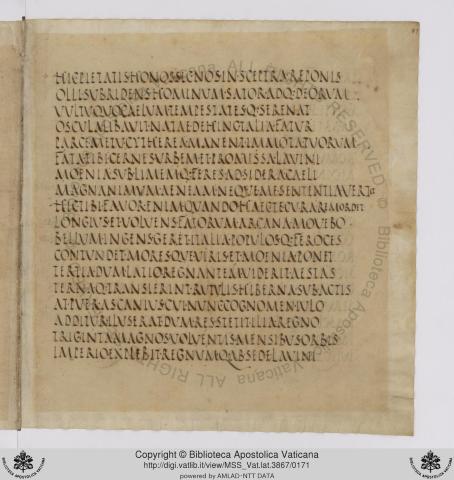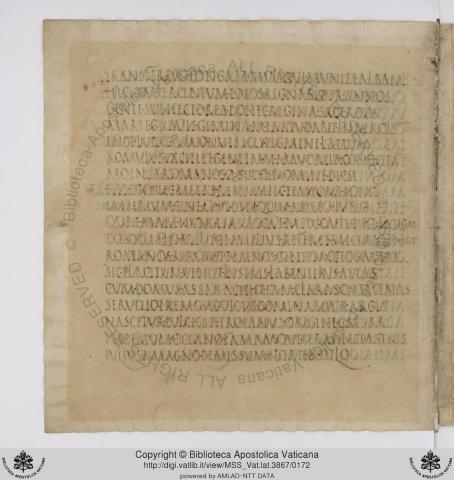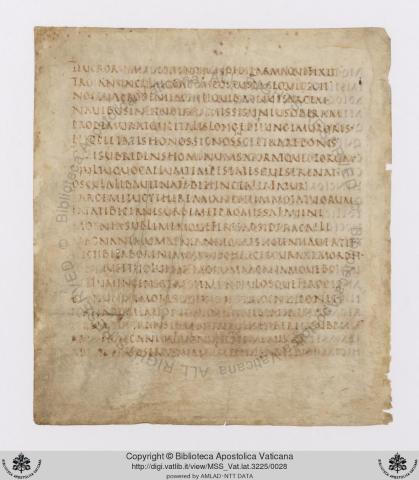Ollī subrīdēns hominum sator atque deōrum
vultū, quō caelum tempestātēsque serēnat,255
ōscula lībāvit nātae, dehinc tālia fātur:
'Parce metū, Cytherēa, manent immōta tuōrum
fāta tibī; cernēs urbem et prōmissa Lavīnī
moenia, sublīmemque ferēs ad sīdera caelī
magnanimum Aenēān; neque mē sententia vertit.260
Hic tibi (fābor enim, quandō haec tē cūra remordet,
longius et volvēns Fātōrum arcāna movēbō)
bellum ingēns geret Ītaliā populōsque ferōcēs
contundet mōrēsque virīs et moenia pōnet,
tertia dum Latiō rēgnantem vīderit aestās265
ternaque trānsierint Rutulīs hīberna subāctīs.
At puer Ascanius, cui nunc cognōmen Iǖlō
additur (Īlus erat, dum rēs stetit Īlia rēgnō),
trīgintā magnōs volvendīs mēnsibus orbēs
imperiō explēbit, rēgnumque ab sēde Lavīnī270
trānsferet, et Longam multā vī mūniet Albam.
notes
Manuscripts: M 254-262, 263-271 | R 254-270, 271 | F
Jupiter comforts Venus by telling her of the coming glory of Aeneas and of his descendants, the Romans, who are to rule the world (Wetherell).
254: Olli: dat. of ollus the old form of ille, is used intentionally by Vergil as an archaism (P-H).
256: oscula: “kisses,” lit. “little mouths,” the suffix -culum indicating “diminution” (Robertson) (AG 243). libavit: “gently kissed” (F-B). “Lightly touched”; this word is derived from the Gr. λοιβή “an offering poured out,” and its meaning has been colored by the Roman custom of first making libation to some deity by spilling a little wine from their cups before beginning to drink it; hence besides denoting the act of libation the verb developed the meaning of beginning to drink, or to taste (Conway). natae: dative, i.e., Venus (Robertson). Might be either Dat. (like iactanti 102) or Gen. (Conway). dehinc: monosyllable by synizesis (F-B). fatur: as historical present (AG 469), may rightly be coupled with libavit (Knapp).
257: metu: for metui (Frieze) (AG 89). Cytherea: Venus was called the Cytherean, because she sprang from the sea-foam near the island of Cythera, south of Greece (F-B). immota: predicative (Wetherell).
258: tibi: ethical dative (F-B) (AG 380). Comes last with emphasis: “here and now as you shall see” (Conway). In the following lines Vergil indicates his conception of the character and mission of Aeneas in language similar to that used of the Roman nation in Book 6, lines 852–854 (P-H). urbem et promissa Lavini moenia: both promissa and Lavini belong logically to urbem as well as to moenia (F-B). Lavini: for Lavinii, genitive (Frieze). Lavinium, a city subsequently founded by Aeneas and named after Lavinia, daughter of king Latinus (Carter).
259: sublimem: in reference to the apotheosis of Aeneas (Walpole). feres ad sidera caeli: in accordance with the promise alluded to above, 250 (Frieze).
261: hic tibi: refers to Aeneas (Frieze). Ethical dative (F-B) (AG 380). Dative of interest (Knapp). quando: = quandoquidem (Storr). = quoniam (Jerram). haec cura: anxiety on his account (Frieze).
262: longius et volvens: the secrets of fate are conceived as written on a roll. volvens = evolvens (F-B). volvens is descriptive of the opening of a scroll or volume, in which the decrees of fate are conceived to be written (Frieze). movebo: “will reveal” (F-B). A metaphor from the ancient book, which must be unrolled in order to be read (Walpole). The idea is that of disturbing the secrets of the future or routing them out from the place where they now rest and where they should continue to rest until the fullness of time is come (Knapp).
263: Italia: = in Italia (Walpole) (AG 429.4). ferox: (from ferus, as atrox beside ater, velox presumably from velum “sail”) suggests always the finer qualities of a wild beast, “courageous, defiant, independent” (Conway).
264: moresque viris et moenia ponet: “and for his people will set up laws and city walls.” The phrase mores et moenia (note the alliteration) expresses both (moenia) the outward and visible sign, and (mores) the inward spirit of a settled community. Though mores ponere is a rare expression, leges ponere is common (F-B). mores: here “constitution,” or “civil organization,” and “laws” (Frieze). Suggests political institutions, the whole social system (Knapp). viris: dat. of reference. Some say the conquered Rutuli are referred to, some say his own people (Wetherell). ponet: “will establish,” in the double sense of setting up political institutions (mores ponet) and building a city (moenia ponet) (P-H). Applied by zeugma to both mores (= “impose”) and moenia (= “build”) (Walpole).
265: dum: “until” (F-B) (AG 553 note 2). Latio: = in Latio (Walpole). regnantem: sc. eum: Aeneas (Carter). Not “beginning his reign,” but “continuing his reign” (Frieze). viderit: future perfect (F-B) (AG 553 note 2). viderit and transierint are probably prospective subjunctives, of an event foreseen and provided for (Conway).
266: ternaque...subactis: “and thrice the winters have passed in camp over the conquered Rutulians,” i.e., after conquering the Rutulians Aeneas spends three winters in camp before founding Lavinium (F-B). terna: because castra (understood with hiberna) is a noun used only in the plural (F-B) (AG 137b). We have terna, not tria, because with nouns found only in the pl. the distributive numerals, not the cardinal are used (Knapp). hiberna: sc. castra; “winter encampment” used for “winter” in general (Carter). Rutulis subactis: probably a dative of reference, a construction common in Greek with expressions of time. The Rutulians, under their king Turnus, were the chief opponents of Aeneas on his arrival in Latium (F-B). A kind of remote dative after transierint; but whether we take it as a dative, or as an ablative absolute, the sense is “after the subjection of the Rutulians” (Frieze).
267: Ascanius: son of Aeneas and Creusa. His original name was Euryleon, and after the flight from Troy he received the name Ascanius, from a river of Phrygia; he was never called Iulus except by the Roman poets (Robertson) (Smith’s Dictionary, s.v. Ascanius). Iulo: Dative by attraction (F-B) (AG 373a). The name Iulus seems to appear in extant earlier Latin literature only in Livy (1.3.2). It was adopted by the Julian family, or by their eulogists, as the form from which to derive Iulius, and as bearing some resemblance to the name of the Trojan king Ilus, founder of Ilium (Frieze). regno: ablative of manner (Frieze).
268: res...Ilia: the Ilian state, i.e., Troy (F-B). res: = res publica (Knapp). dum stetit: “while” with perf. ind., of an event quite past (Conway) (AG 556a). stetit...regno: “stood firm in sovereignty” (F-B). regno: ablative of specification (F-B) (AG 418). Abl. showing in what respect the signification of stetit is taken (Chase). Best regarded as an abl. of manner (Wetherell) (AG 412).
269: magnos volvendis mensibus orbes: “great circles of revolving months”; that is, great annual circles or years, each of which consists of revolving moons or months (Frieze). “Great circles (of years) with their revolving months.” The tone is oracular (F-B). The whole line is poetical for triginta annos (Walpole). volvendis: for se volventibus (Frieze). The gerundive is occasionally used like a present participle (F-B) (AG 500.1). The gerund in this and other passages almost supplies the want of a Latin present participle passive. The meaning is active, as though it were from a deponent volvor (Carter). mensibus: ablative of quality (F-B) (AG 415). Ablative of description (Frieze) (AG 415).
270: imperio: = imperando (Walpole). Abl., “in his sovereignty” (Jerram). May be either dative, “for his reign,” or modal abl. = imperando (Conington).
271: vi: “with strength,” not only in position and fortifications, but in population and resources (Frieze). muniet: this verb often signifies, not to strengthen that which has been already built, but “to build strong,” or simply “to build” (Frieze). Longam...Albam: Alba Longa. Note the alliteration in multa muniet (F-B).
vocabulary
subrīdeō, rīsī, 2, n.: to smile, 1.254; 10.742.
sator, ōris, m.: a planter; sire, father, 1.254. (1. serō)
serēnō, āvī, ātus, 1, a. and n.: to make clear or calm, 1.255; spem serēnāre, to exhibit the calm or cheerful look of hope, 4.477. (serēnus)
ōsculum, ī, n.: the lip, 1.256; kiss, 1.687. (1. ōs)
lībō, āvī, ātus, 1, a.: to taste, sip; to touch lightly; kiss, 1.256; pour out as a drink offering, 1.736; make a libation, 3.354; (w. acc. of the object on which the libation is poured), to pour libations on, 12.174.
nāta, ae: a daughter, 1.256. (nascor)
dehinc (often monosyll.): (adv.), from this place; from this time; thereupon, then, 1.131.
Cytherēus, a, um: adj. (Cythēra), Cytherean; subst., Cytherēa, ae, f., the Cytherean goddess; Venus, 1.257.
immōtus, a, um: (adj.), unmoved, motionless; immovable, 3.77; (fig.), firm, fixed, steadfast, unchangeable, 1.257.
tuī, ōrum, m.: your friends, kinsmen, countrymen, descendants, etc., 3.488; freq. (tuus)
Lāvīnium, iī, n.: a city of Latium, built by Aeneas and named after his Latin wife, Lavinia, 1.270, et al. (Lāvīnia)
sublīmis, e: (adj.), raised up, elevated, uplifted, 11.602; aloft; on high, 1.259; through the air, 1.415; on high, 6.720; to heaven, 5.255; of lofty soul, 12.788; (adv.), sublīme, loftily, aloft, on high, 10.664.
māgnanimus, a, um: adj. (māgnus and animus), possessing a great soul; noble-minded; great, generous, noble, 5.17; brave, 10.139; mighty, 12.144; of animals, high-spirited, highbred, 3.704.
Aenēās, ae, m.: 1. A Trojan chief, son of Venus and Anchises, and hero of the Aeneid, 1.92. 2. Aenēās Silvius, one of the Alban kings, 6.769.
remordeō, no perf., morsus, 2, a.: to bite again and again; (fig.), harass, torment, vex, afflict, 1.261; disturb, concern, 7.402.
volvō, volvī, volūtus, 3, a.: to roll, 1.86; roll along or down, 1.101; roll or cast up, 3.206; toss, hurl, 12.906; roll over, roll in the dust, 12.329; cast, hurl down, 1.116; 9.512; roll, wheel, 1.163; of books, open, unroll, 1.262; of the Fates, fix the circle of events, decree, ordain, dispose, 1.22; 3.376; of the mind, revolve, meditate, reflect upon, 1.305; pass, continue, live through, experience, endure, suffer, 1.9; rotam volvere, to complete a cycle, period; (pass.), volvī, roll over, roll, 10.590; turn or wind about, 7.350; to be shed, to flow, 4.449; roll on, revolve, 1.269.
arcānus, a, um: adj. (arca), hidden, secret, 4.422; subst., arcānum, ī, n., a secret, 1.262.
Ītalia, ae (Ī by poetic (epic) license), f.: Italy, 1.2, et al.
ferōx, ōcis: adj. (ferus), wild; impetuous; ferocious, fiery, fierce, 5.277; warlike, martial; proud, 12.895.
contundō, tudī, tūnsus, or tūsus, 3, a.: to pound thoroughly; beat, bruise, pound; (fig.), subdue, conquer, 1.264.
Latium, iī, n.: a country of ancient Italy, extending from the left bank of the lower Tiber to Campania, 1.6; (meton.), for Latīnī, the Latins, people of Latium, 10.365, et al. (2. latus; Virgil, 8.323, derives it from lateō)
rēgnō, āvī, ātus, 1, n. and a.: to exercise sovereignty; to be king, to reign, 1.141; rule, govern, 3.14; impers., rēgnātur, etc., there is kingly rule, 1.272. (rēgnum)
aestās, ātis, f.: the summer, 1.265, et al.; summer air, 6.707; a year.
ternī, ae, a.: distrib. num. adj. (trēs), three each, 5.247; as a cardinal, three, 1.266; once in the sing., ternō ōrdine, in triple rank, in three tiers, 5.120.
trānseō, iī, itus, īre, irreg. n. and a.: to go across; go through, pass, 12.926; pass by, 5.326; pass away, 1.266; run over, 5.274; pass through, 9.413.
Rutulī, ōrum, m.: the Rutulians, an ancient tribe of Latium dwelling south of the Tiber, 1.266, et al.
hīberna, ōrum, n.: winters, 1.266.
subigō, ēgī, āctus, 3, a.: to drive under or up; drive, push, force, drive on, urge, compel, 5.794; subdue, subject, conquer, 1.266; urge on, exasperate, 12.494. (sub and agō)
Ascanius, iī, m.: Ascanius, son of Aeneas, and traditional founder of Alba Longa, 1.267.
cognōmen, inis, n.: a name common to a family; a surname; name, 1.267.
Iūlus, ī, m.: Iulus or Ascanius, son of Aeneas, 1.267, et freq.
Īlus, ī, m.: 1. Ilus, son of Tros and king of Troy, 6.650. 2. An earlier name of Ascanius or Iulus, 1.268. 3. Ilus, a Rutulian, 10.400.
Īlius, a, um: adj. (Īlium), of Ilium; Ilian, Trojan, 1.268.
trīgintā: (num. adj., indecl.), thirty, 1.269.
mēnsis, is, m.: a month, 1.269.
expleō, plēvī, plētus, 2, a.: to fill completely; fill up; gorge, 3.630; satisfy, 1.713; finish, complete, 1.270; w. gen., satiate, glut, 2.586.
trānsferō, tulī, lātus, ferre, irreg. a.: to carry over; transfer, remove, 1.271; give over, 2.327.
longus, a, um: (adj.), long, 1.186, and freq.; extended, far-extending, 3.383; distant, 2.780; far-receding, deep, 1.159; in time, long, protracted, 2.109; long-continued, 4.463; many, 10.549; lingering, 8.488; abiding, lasting, 3.487; superl., very long, 1.641; ex longō, long, 9.64; (adv.), longum, for a long time, long, 10.740; a long distance.
mūniō, īvī or iī, ītus, 4, a.: to inclose with walls; fortify; construct, build, 1.271. (moenia)
Alba, ae, f.: Alba or Alba Longa, a town on the Alban hills in Latium, from which Rome originated, 1.271.



